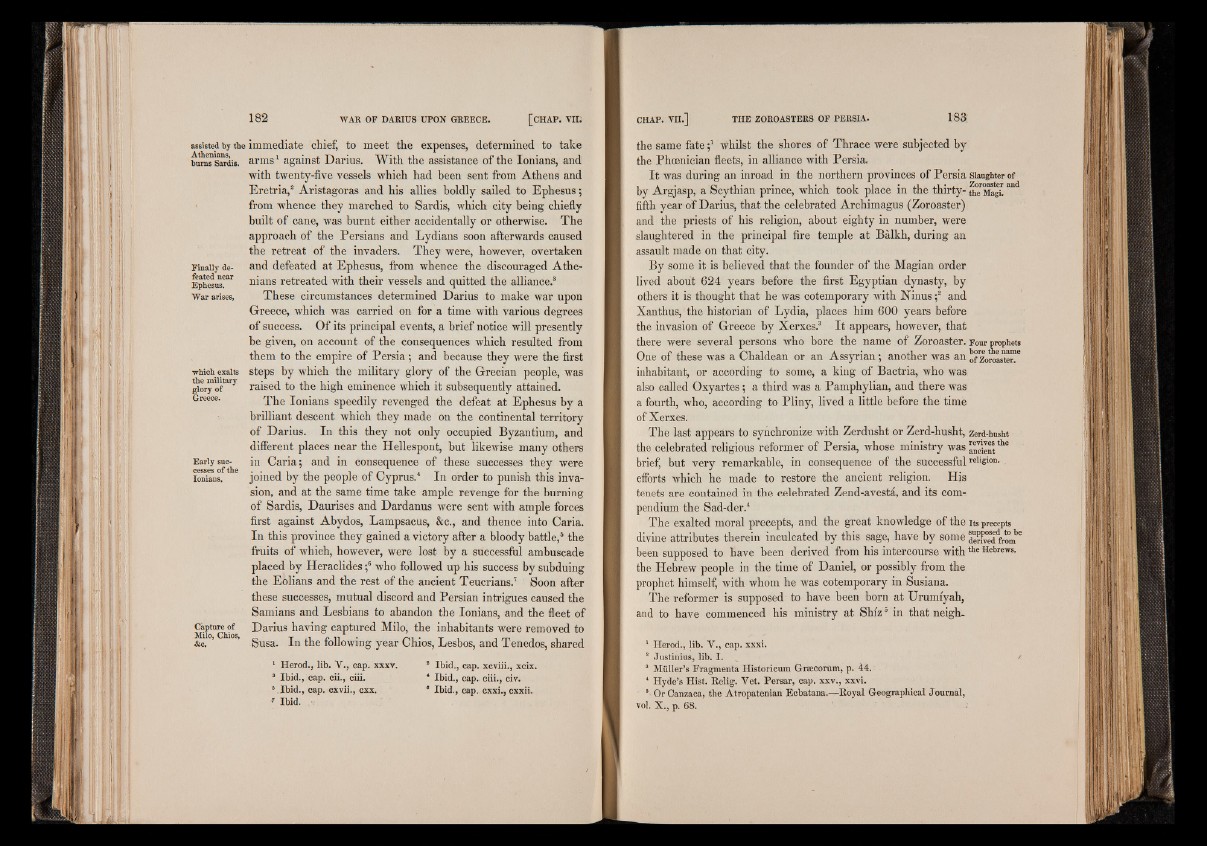
assisted by the immediate chief, to meet the expenses, determined to take
bums Sardis, arms1 against Darius. With the assistance of the Ionians, and
with twenty-five vessels which had been sent from Athens and
Eretria,2 Aristagoras and his allies boldly sailed to Ephesus;
from whence they marched to Sardis, which city being chiefly
built of cane, was burnt either accidentally or otherwise. The
approach of the Persians and Lydians soon afterwards caused
the retreat of the invaders. They were, however, overtaken
Finally de- and defeated at Ephesus, from whence the discouraged Athe-
Ephesus?ar nians retreated with their vessels and quitted the alliance.3
War arises, These circumstances determined Darius to make war upon
Greece, which was carried on for a time with various degrees
of success. Of its principal events, a brief notice will presently
be given, on account of the consequences which resulted from
them to the empire of Persia; and because they were the first
which exalts steps by which the military glory of the Grecian people, was
glory oftary raised to the high eminence which it subsequently attained.
Greece. The Ionians speedily revenged the defeat at Ephesus by a
brilliant descent which they made on the continental territory
of Darius. In this they not only occupied Byzantium, and
different places near the Hellespont, but likewise many others
Early sue- in Caria; and in consequence of these successes they were
ionians. joined by the people of Cyprus.4 In order to punish this invasion,
and at the same time take ample revenge for the burning
of Sardis, Daurises and Dardanus were sent with ample forces
first against Abydos, Lampsacus, &c., and thence into Caria.
In this province they gained a victory after a bloody battle,6 the
fruits of which, however, were lost by a successful ambuscade
placed by Heraclides ;6 who followed up his success by subduing
the Eolians and the rest of the ancient Teuerians.7 Soon after
these successes, mutual discord and Persian intrigues caused the
Samians and Lesbians to abandon the Ionians, and the fleet of
m^CEos Darius having captured Milo, the inhabitants were removed to
&c. ’ ’ Susa. In the following year Chios, Lesbos, and Tenedos, shared
1 Herod., lib. V., cap. xxxv. 1 Ibid., cap. xcviii., xcix.
s Ibid., cap. cii., ciii. 4 Ibid., cap. ciii., civ.
5 Ibid., cap. cxvii., cxx. 4 Ibid., cap. cxxi., cxxii.
7 Ibid.
the same fa tew h ils t the shores of Thrace were subjected by
the Phoenician fleets, in alliance with Persia.
It was during an inroad in the northern provinces of Persia slaughter of
by Argjasp, a Scythian prince, which took place in the thirty-toMagb*n
fifth year of Darius, that the celebrated Archimagus (Zoroaster)
and the priests of his religion, about eighty in number, were
slaughtered in the principal fire temple at Balkh, during an
assault made on that city.
By some it is believed that the founder of the Magian order
lived about 624 years before the first Egyptian dynasty, by
others it is thought that he was cotemporary with JSTinus;2 and
Xanthus, the historian of Lydia, places him 600 years before
the invasion of Greece by Xerxes.3 It appears, however, that
there were several persons who bore the name of Zoroaster. Four prophets
One of these was a Chaldean or an Assyrian; another was an Zoroasten*
inhabitant, or according to some, a king of Bactria, who was
also called Oxyartes; a third was a Pamphylian, and there was
a fourth, who, according to Pliny, lived a little before the time
of Xerxes.
The last appears to synchronize with Zerdusht or Zerd-husht, zerd-husht
the celebrated religious reformer of Persia, whose ministry was 1116
brief, but very remarkable, in consequence of the successful relision-
efforts which he made to restore the ancient religion. His
tenets are contained in the celebrated Zend-avesta, and its compendium
the Sad-der.4
The exalted moral precepts, and the great knowledge of the its precepts
divine attributes therein inculcated by this sage, have by some S i f ™ 6
been supposed to have been derived from his intercourse withthe Hebrews,
the Hebrew people in the time of Daniel, or possibly from the
prophet himself, with whom he was cotemporary in Susiana.
The reformer is supposed to have been born at Urumiyah,
and to have commenced his ministry at Shiz5 in that neigh-
1 Herod., lib. V., cap. xxxi.
s Justinius, lib. I.
8 Muller’s Fragments, Historieum Gracorum, p. 44.
4 Hyde’s Hist. Relig. Yet. Persar, cap. xxv., xxvi.
4 Or Canzaca, the Atropatenian Ecbatana.—Royal Geographical Journal,
vol. X., p. 68.